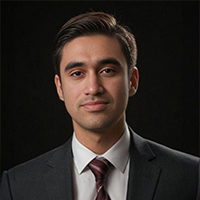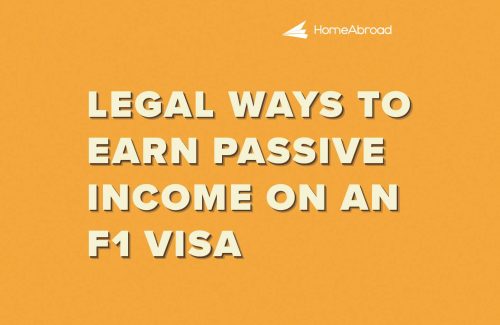Building financial stability as an F1 visa holder may seem challenging due to strict work limitations, but it’s not impossible. While employment options are restricted, there are legal ways to earn passive income without violating your immigration status.
With the right approach, you can supplement your finances, cover expenses, and even start planning for the future while focusing on your studies.
This guide explores legitimate passive income opportunities available to F1 visa holders, helping you make the most of your time in the US.
Table of Contents
Understanding Work Rules for F1 Visa Holders
The US government places strict restrictions on employment for F-1 students. There are two primary categories of work authorization:
1. On-Campus Employment (Permitted)
F-1 students are allowed to work on-campus at their university without additional work authorization. This includes working in university-owned facilities such as libraries, dining halls, research labs, and administrative offices.
The job must be directly affiliated with the school and cannot involve an external business, even if it operates within the campus premises.
On-Campus Work Rules:
- Work Hours: Up to 20 hours per week when school is in session. Up to 40 hours per week during school breaks and summer vacation.
- Must be within the university (or an affiliated institution, like a university hospital).
Example: You can work as a teaching assistant, librarian, or lab assistant, but you cannot work at a coffee shop on campus if it is owned by a private company rather than the university.
2. Off-Campus Employment (Requires Authorization)
F1 students cannot work off-campus unless they obtain special authorization under one of the following programs:
Curricular Practical Training (CPT)
CPT allows F-1 students to work off-campus in an internship or job related to their major. To be eligible, students must have completed at least one full academic year in the US, and the job must be an integral part of their curriculum, meaning it must be required or highly recommended for their degree program.
Example: A computer science student doing an internship at Google through their university’s internship program is allowed to work under CPT.
Optional Practical Training (OPT)
OPT allows F-1 students to work off-campus for up to 12 months in a job related to their field of study. This can be used before (pre-completion OPT) or after (post-completion OPT) graduation.
Students must apply for an Employment Authorization Document (EAD) from USCIS before beginning employment.
Example: A business student graduating in May can apply for post-completion OPT and start working for a US company in their field.
STEM OPT Extension (Additional 24 Months)
Students with a degree in Science, Technology, Engineering, or Math (STEM) can extend their OPT for 24 more months, allowing them to work for 36 months. To qualify, the job must be directly related to their STEM degree, and the employer must be enrolled in E-Verify, a federal employment verification program.
Example: A data analyst working on a 12-month OPT can apply for a 24-month STEM extension if they have a degree in computer science.
Legal Ways to Earn Passive Income
While F-1 visa holders have work restrictions, there are several legal ways to earn passive income without violating immigration laws.
The key is ensuring that income sources do not require active participation while residing in the US. Below are some legitimate passive income opportunities:
1. Investing in Stocks & Bonds
Investing is one of the easiest ways to earn a passive income legally. As an F1 visa holder, you can open a brokerage account and invest in:
✅ Stocks – Earn money through dividends and long-term appreciation.
✅ Bonds – Receive interest payments from government or corporate bonds.
✅ Mutual Funds & ETFs – Diversified investment portfolios that generate returns over time.
Example: If you invest $5,000 in dividend-paying stocks with a 5% annual return, you can earn $250 annually without any active work. However, active day trading may be viewed as self-employment, which is not allowed under F1 regulations.
2. Real Estate Investments
Owning rental property can be a profitable passive income source, and the good news is that F-1 visa holders can buy property in the US even without a US credit history. You can secure a mortgage designed for foreign nationals to purchase an investment property and generate rental income.
At HomeAbroad, we help F1 visa holders find cash-flow-generating properties and secure the right mortgage to finance their investments. We bring years of experience assisting F1 visa holders and have a deep understanding of the challenges they face, ensuring a seamless investment journey tailored to their unique needs.
Check out our complete guide on buying a house in the US as an international student.
Example: Suppose you purchase a rental property for $300,000 with a mortgage payment of $1,600 per month. If you rent it out for $2,200 per month, your rental income covers your mortgage and leaves you with a positive cash flow of $600 per month, turning your property into a profitable investment while it appreciates in value over time.
However, they cannot actively manage it due to visa restrictions. This means they must hire a property manager to handle tenants, rent collection, and maintenance instead of personally overseeing these tasks.
3. Peer-to-Peer Lending
With peer-to-peer (P2P) lending, you can loan money to borrowers and earn interest. This is a completely legal passive income method for F1 holders.
Popular P2P platforms:
- Prosper
- LendingClub
- Fundrise
Example: If you lend $5,000 at a 10% interest rate, you could earn $500 per year in interest payments without actively working.
4. Entering Competitions
Many competitions offer cash prizes, scholarships, or valuable rewards without requiring active employment. As an F1 visa holder, you can legally participate in contests related to academics, writing, coding, design, and other skill-based areas.
Some competitions even provide grants or funding opportunities, which can be a great way to earn money without violating visa rules.
Example: Winning a data science competition or a startup pitch contest can provide financial rewards while also enhancing your resume.
Legal Considerations for F1 Visa Holders
As an F1 visa holder, it’s crucial to stay compliant with US immigration laws while exploring work, investment, or income opportunities. Any unauthorized employment or business activity can put your visa status at risk, potentially leading to visa revocation or deportation.
F1 visa holders must follow employment restrictions, which generally allow on-campus jobs and limited off-campus work through OPT (Optional Practical Training) or CPT (Curricular Practical Training). Any work outside these approved categories without proper authorization is considered a violation of visa terms.
If long-term employment in the US is your goal, you may be able to transition to an H1B visa. Here is our guide on how to change your visa status from F1 to H1B.
Tax Considerations for F1 Visa Holders
As an F-1 visa holder, you must file taxes in the US if you earn income from authorized work or investments. The IRS considers most F-1 students non-resident aliens for tax purposes, which means they may have different filing requirements and tax treaty benefits depending on their home country.
Since tax laws vary based on residency status and income sources, it is recommended that you consult a tax professional specializing in non-resident tax filing to ensure compliance and avoid penalties.
Conclusion
While F-1 visa restrictions limit work opportunities, there are still plenty of legal ways to earn passive income. Whether through investing in stocks, real estate, or peer-to-peer lending, you can build financial stability while focusing on your studies.
However, it’s crucial to ensure compliance with US immigration and tax laws. Passive income must remain truly passive—any active involvement in managing a business or working without authorization can affect your visa status.
✅ What to Do Next
✔ Choose a passive income method that fits your financial goals.
✔ Consult a tax professional to ensure compliance with US tax laws.
✔ Avoid any income sources that require active participation or employment authorization.
By understanding your options and following the right approach, you can legally generate passive income and set yourself up for long-term financial success.
Frequently Asked Questions
Can I make money on YouTube while in the US on an F1 Visa?
No, you cannot earn passive income on an F1 visa from your YouTube Channel, TikTok, or any other content platform while you are present in the US on an F1 Visa or OPT.
Can I make money Freelancing while in the US on an F1 Visa?
No, you cannot make passive income on an F1 visa as a freelancer. It is not allowed on your student F1 visa or even on OPT.
Do I need to report passive income while on an F1 visa?
Yes, any income earned, including passive income, must be reported to the IRS. F1 visa holders should ensure they comply with tax laws and file the necessary tax returns.

















